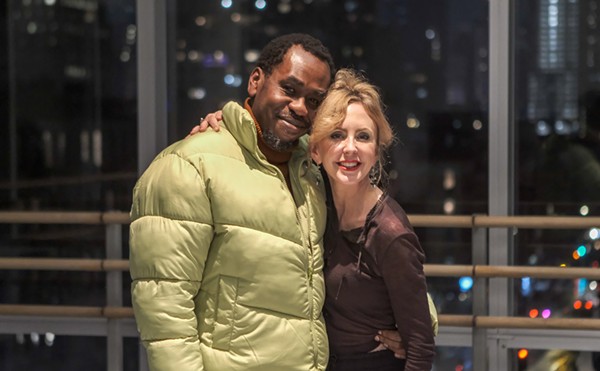When Columbine went down, I was a little too cool for video games. I mean, I had played Wolfenstein and Doom, and sometimes a little Nintendo 64 at a friend's house. But I didn't really care enough about video games to spend money on them, much less get antsy once all kinds of politicians started threatening to step in and curtail the shooting and the violence and whatnot. I imagine most people are in the same position.
So, I don't really know if video games got any less violent after the shootings at Columbine High School. I remember people talking about it a lot. But it was just talk, I guess -- until Sept. 11 and those couple of weeks when everyone made a big show of being dutifully sensitive. All of a sudden, the Arnold Schwarzenegger movie I had been psyched up about was delayed indefinitely, and a TV show like "Nash Bridges" was scrapped at the last minute because Cheech Marin says a sandwich he's eating is "the bomb."
It wasn't exactly the same debate -- nobody was suggesting that violent movies caused terrorism, the way some suggested violence in the media caused Columbine -- but a lot of the same sentiment was involved. It really seemed like the folks behind movies and TV were doing some serious thinking for a second there, didn't it? The future of graphic violence (especially explosions) in the media was completely open to question.
So it has been six months now. And I've spent the last week playing a video game that seems as if it must have been conceived in the mind of some fanatical, white-haired caricature of a senator who loves to rant and rave about how the moral fiber of the country is being eroded by video games in which grenades and flamethrowers are used to torch crowds of helpless, screaming people in a shopping mall.
The game is called State of Emergency and it's kind of surreal. You really do use flamethrowers to torch crowds of helpless, screaming people in a shopping mall. You get points for it. There's even a voice-over that periodically announces things like, "Destroy buildings for bonus points!" and "Kill Corporation forces!"
State of Emergency is a game about rioting, made for the Playstation 2 by Rockstar Games, a little company that's making quite a name for itself thanks to State and last year's phenomenally popular Grand Theft Auto 3. While GTA 3 was a groundbreaking game in terms of the depth and the freedom it gave to players, most people probably bought it because you can hire a hooker, have sex with her, then beat her to death with a bat to get your money back. You can do that, but it's not like you have to. And there are countless other things you can do -- most of them illegal and very, very immoral.
State of Emergency can be pretty well summed up as a post-WTO-riots Double Dragon. Like the side-scrolling "beat-'em-ups" on the original Nintendo, you're confronted with a seemingly endless supply of disposable enemies, and your job is to whale on them with whatever weapons happen to be conveniently strewn about the street. The game doesn't attempt to capture the actual atmosphere of real rioting, and while there's no doubt that the protests in Seattle and elsewhere were a major inspiration for State of Emergency, the ideologies involved are just stand-ins for the good plumber and the evil dinosaur king.
The opening sequence explains how "The Corporation" has taken over the world, dissolved democratic government, and now forces people into a hyperconsumerist lifestyle of obedient spending. There are two modes of play: "Revolution" and "Chaos." In the former, a series of missions are completed in a specific locale (the Mall, Chinatown, etc.) for a resistance group called "Freedom." As missions are completed, new characters and levels are unlocked. In "Chaos" mode, a timer counts down as points are racked up by pummeling the Corporation's security forces, destroying Corporation property and the like. You do lose points for killing civilians, but it's awfully hard to resist, as there is never a shortage of them -- all the game play takes place amid a screen full of hundreds of running, screaming rioters, some carrying cash registers or TV sets over their heads.
Is it anti-consumerist? Anti-corporate? Yes, but in the same way that Sonic the Hedgehog and Mega Man are anti-scientist. Kids won't be rushing out to join a black bloc, but then again, it wouldn't be surprising to find kids on a playground substituting rebels and corporations for cops and robbers.
Is that why I like these games? I don't know. I can definitely see the chest-pounding, Maxim-reading sort of guy getting a huge boner for this type of in-your-face, over-the-top violence. But it's not like you have to pretend that you're offending someone in order to enjoy playing them -- they're genuinely addictive and entertaining, for the same reasons as Galaga or Ms. Pac-Man: A funny little world compels a player to plug away for more points. Still, it is hard not to think about the fuming white-haired senator banging his fist on the table as some underling plays him a videotape of SOE's bandanna-clad protagonists tossing Molotov cocktails in corporate coffee-shops windows in the name of freedom.
These days I'm waiting for the fists to start banging. I'm shooting an M-16 at guys in fatigues on a street, and all I can think is: Why aren't parents freaking out about this? Where was the picket line at Best Buy? Why hasn't Joe Lieberman come to my house and shamed me for ignoring the Olympics and shooting shotguns at police officers on my PS2 instead? Have we decided that video games and movies aren't really that much of a threat? If anyone ever wanted to ban a video game, State of Emergency is the straw man from heaven, but nobody's taking a shot.
Maybe those groups of people who would usually be outraged are just embarrassed. I seriously doubt State of Emergency would exist if there had never been a popular movement to cut down on the violence in video games. The concerned parents may feel jaded because the video-game industry has ceased even to try to argue with them and now just steals their hyperbolic descriptions of morally corrupt entertainment to make top-selling games. Or maybe they played the game and realized that giddily murdering hundreds of screaming cartoon people on the TV set doesn't feel that much different from stomping Koopas or dropping blocks on each other. I suppose it isn't so hard to picture the white-haired senator with a Playstation controller in his hands and his feet up on the mahogany boardroom table, shouting accusations at the screen like, "Oh, my god! The computer cheats!"
Whatever the case, I don't feel so bad about voicing my affection for video games now. I just hope that the lack of outrage doesn't stifle the creativity of the folks at Rockstar. I might even pick up a sign and picket myself, if it'll help the cause.

















